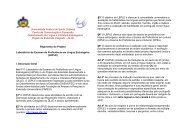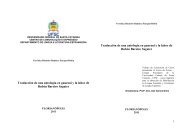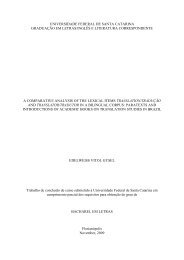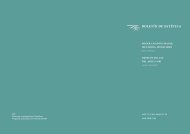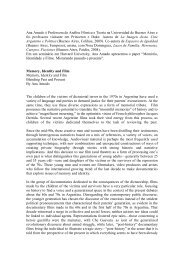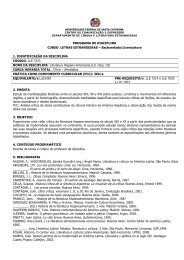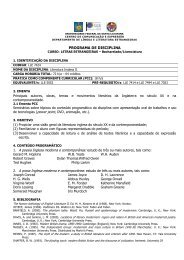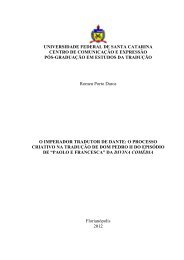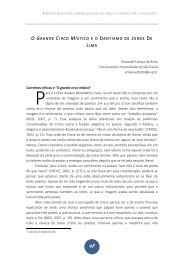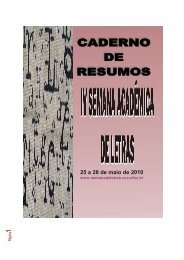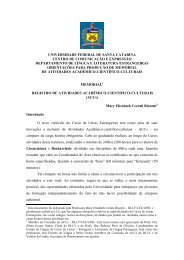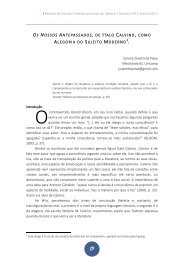LLE5028 - Análise do Discurso Oral e Escrito em LÃngua Inglesa VIII
LLE5028 - Análise do Discurso Oral e Escrito em LÃngua Inglesa VIII
LLE5028 - Análise do Discurso Oral e Escrito em LÃngua Inglesa VIII
- No tags were found...
You also want an ePaper? Increase the reach of your titles
YUMPU automatically turns print PDFs into web optimized ePapers that Google loves.
UNIVERSIDADE FEDERAL DE SANTA CATARINACENTRO DE COMUNICAÇÃO E EXPRESSÃODEPARTAMENTO DE LÍNGUA E LITERATURA ESTRANGEIRASCOORDENADORIA DA ÁREA DE INGLÊSIDENTIFICAÇÃOPROGRAMACódigo e nome da disciplina: LLE 5028 – Análise <strong>do</strong> <strong>Discurso</strong> <strong>Oral</strong> e <strong>Escrito</strong> <strong>em</strong>Língua <strong>Inglesa</strong> <strong>VIII</strong>Curso: Licenciatura e Bacharela<strong>do</strong> <strong>em</strong> Língua <strong>Inglesa</strong> e Literatura de Língua <strong>Inglesa</strong>Carga-horária: 60 h/aEMENTAIntrodução à análise <strong>do</strong> discurso oral e escrito aplicada ao inglês. Discussão de princípios teóricos detradição anglo-americana, com análise de diferentes gêneros textuais orais e escritos, relacionan<strong>do</strong>osa contextos sócio-culturais específicos.OBJETIVOS1. Levar o aluno a desenvolver conhecimento consciente sobre princípios teóricos detradição anglo-americana a respeito da comunicação oral e escrita, aprofundan<strong>do</strong> acompreensão da inter-relação entre texto, discurso e contexto sócio-cultural.2. Habilitar o aluno a avaliar, de maneira sist<strong>em</strong>ática, através de princípios da análise <strong>do</strong>discurso, textos de diferentes gêneros orais e escritos, b<strong>em</strong> como a sua própriaprodução textual.3. Propiciar ao aluno a oportunidade de realizar uma breve pesquisa de campo,apresentada <strong>em</strong> trabalho escrito, exploran<strong>do</strong> diferenças entre linguag<strong>em</strong> oral e escrita,aplican<strong>do</strong> princípios teóricos estuda<strong>do</strong>s.CONTEÚDO PROGRAMÁTICO1. A análise de textos orais e escritos sob a perspectiva da gramática sistêmicofuncional,com revisão <strong>do</strong> contexto de situação: campo (field), relações (tenor) e mo<strong>do</strong>(mode);2. Aprofundamento da noção de contexto da cultura: gêneros textuais, orais e escritos;3. Diferenças entre linguag<strong>em</strong> oral e linguag<strong>em</strong> escrita;4. Atos de fala: direto e indireto;5. Princípio da Cooperação (As máximas de Grice);6. Pares adjacentes, tomada de turno e marca<strong>do</strong>res discursivos;7. Estruturação da mensag<strong>em</strong>: el<strong>em</strong>entos de coesão textual e organização global dediferentes gêneros orais e escritos;8. Aprofundamento sobre aplicações da análise (crítica) <strong>do</strong> discurso.BIBLIOGRAFIA BÁSICAButt, D., Fahey, R., Spinks, S. & Yallop, C. (1995). Using functional grammar: An explorer’s guide.Sydney: Macquarie University.Cook, G. (1989). Discourse. Oxford: Oxford Univ. Press.Eggins, S. and Slade, D. (1997). Analysing casual conversation. Lon<strong>do</strong>n: Cassell.Fairclough, N. (1989). Language and Power. Lon<strong>do</strong>n: Longman.McCarthy, M. & Carter, R. (1994). Language as discourse: Perspectives for language teaching.Lon<strong>do</strong>n: Longman.Montgomery, M. (1986). An introduction to language and society. Lon<strong>do</strong>n: Methuen.
BIBLIOGRAFIA COMPLEMENTARBex, T. (1996). Variety in written English. Lon<strong>do</strong>n and New York: Routledge.Carter, R. and McCarthy, M. (1997). Exploring spoken English. Cambridge: CUP.Coulthard, M. (1994). Advances in written text analysis. Lon<strong>do</strong>n: Routledge.Grice, P. (1975). Logic and conversation, In: P. Cole and J. L. (Eds), Syntax and s<strong>em</strong>antics 3: Speechacts. Morgan. New York: Acad<strong>em</strong>ic Press.________ .(Ed) (1992). Critical language awareness. Lon<strong>do</strong>n: Longman.Halliday, M. A. K. & Hasan, R. (1989). Language, context, text: Aspects of language in a socials<strong>em</strong>iotic perspective. 2.ed. Oxford: Oxford University Press.Heberle, V. M. (2000). Critical reading: integrating principles of critical discourse analysis and genderstudies. Ilha <strong>do</strong> Desterro, 38.115-138.Hughes, R. and McCarthy, M. (1999). From sentence to discourse: Discourse grammar and Englishlanguage teaching. TESOL Quarterly, 32, 263-287.Meurer, J. L. (1998). Aspects of language in self-help counseling. Florianópolis: Pós-Graduação <strong>em</strong>Inglês, UFSC.___________ (1999). You think, I know: Argumentation in self-help counselling. In: F. H. vanE<strong>em</strong>eren, R. Grooten<strong>do</strong>rst, J. A. Blair, and C. A. Willard (Eds.) Proceedings of the FourthInternational Conference of the International Society for the Study of Argumentation; pp. 573-577.Amsterdam: SIC SAT.Sinclair, J. McH, Hoey, M. and Fox, G. (Eds.). (1993). Techniques of description: Spoken and writtendiscourse. Lon<strong>do</strong>n: Routledge.Swales, J. M. and Feak, C. B. (1994). Acad<strong>em</strong>ic writing for graduate students. Ann Arbor: TheUniversity of Michigan Press.Tannen, D. (1986) That’s not what I meant: How conversational style makes or breaks your relationswith others. New York: William Morrow.Artigos seleciona<strong>do</strong>s <strong>do</strong>s seguintes periódicos: Discourse & Society, Discourse Studies, Text,TESOL Quarterly, the ESPecialist, Ilha <strong>do</strong> Desterro, Linguag<strong>em</strong> e Ensino.Dicionários: Collins Cobuild, Longman, Oxford, Webster, Lexicon, American Heritage, etc.




